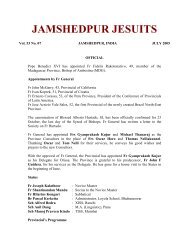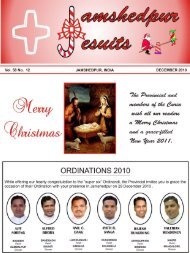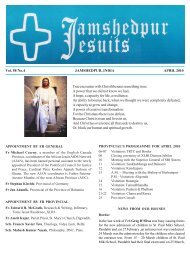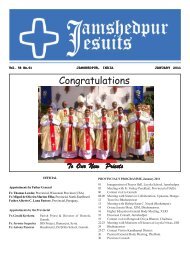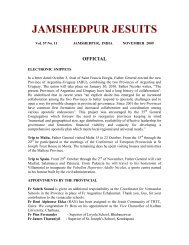Click here to download - Jamshedpur Jesuits
Click here to download - Jamshedpur Jesuits
Click here to download - Jamshedpur Jesuits
Create successful ePaper yourself
Turn your PDF publications into a flip-book with our unique Google optimized e-Paper software.
Christmas Special<br />
By Kathleen M. Carroll<br />
Christmas<br />
Light<br />
in Winter’s<br />
Darkness<br />
The s<strong>to</strong>ry of his birth: We<br />
all know the s<strong>to</strong>ry of Jesus’ birth in<br />
Bethlehem. In Scripture, each Gospel<br />
writer tells the s<strong>to</strong>ry a little differently.<br />
Matthew begins his Gospel with “An<br />
account of the genealogy of Jesus the<br />
Messiah...” before setting down his<br />
telling of the Nativity s<strong>to</strong>ry. Luke gives<br />
the most detailed and comprehensive<br />
account of the birth of Jesus, with great<br />
emphasis on the Marian aspect of the<br />
s<strong>to</strong>ry. Mark and John both begin with<br />
Jesus’ encounter with John the Baptist,<br />
skipping over the s<strong>to</strong>ry of Jesus’ life<br />
prior <strong>to</strong> the events that led <strong>to</strong> his public<br />
ministry. For most of us, however, the<br />
Gospel s<strong>to</strong>ries, our traditions and even<br />
a few elements contributed by pious and<br />
not-so-pious authors have merged in<strong>to</strong><br />
one big s<strong>to</strong>ry about the birth of Jesus.<br />
We know that Jesus was conceived<br />
by the Virgin Mary and born in Bethlehem<br />
in the humblest of surroundings. We<br />
know that wise men from the East<br />
followed a star <strong>to</strong> honor the newborn<br />
king, that Joseph had dreams that helped<br />
him protect the child and his mother.<br />
Our songs and traditions incorporate<br />
some or all of these elements in<strong>to</strong> our<br />
celebrations and occasionally embellish<br />
a detail or invent new s<strong>to</strong>ries al<strong>to</strong>gether.<br />
“The Little Drummer Boy,” for example,<br />
will not be peeking at you from the pages<br />
of any Bible.<br />
Christmas wasn’t quite “Christmas”<br />
that first year, though. It was simply Jesus’<br />
birthday. While his mother and earthly<br />
father and a few foreign gentlemen had<br />
an idea that this was no ordinary child,<br />
most people were not attaching the word<br />
“Christ” <strong>to</strong> him just yet.<br />
So while Jesus was growing up,<br />
he and his family didn’t celebrate<br />
Christmas. Their family life centered on<br />
the holy days of the Jewish faith they all<br />
embraced. This is evident in the s<strong>to</strong>ries<br />
about the presentation in the Temple<br />
(remember Simeon and Anna?) and in<br />
the finding in the Temple (after Jesus’<br />
three-day disappearance). We can’t say<br />
with certainty that Mary and Joseph<br />
didn’t celebrate Jesus’ birth day, but the<br />
word ‘birthday’ appears just once in<br />
the Bible (Gen 40:20), <strong>to</strong> refer <strong>to</strong> the<br />
pharaoh’s birthday.<br />
When did the celebration we call<br />
Christmas really start? About 300 years<br />
after the birth of Jesus.<br />
The Early Church: In its<br />
infancy, Christianity was not a popular<br />
religion. Believers met secretly <strong>to</strong> share<br />
the Scriptures, celebrate the Eucharist<br />
and encourage one another in the faith.<br />
Once Christianity was seen as its own<br />
religion and not simply one branch of<br />
Judaism (as the Romans first unders<strong>to</strong>od<br />
it), it lost the special privilege the<br />
Empire had long granted <strong>to</strong> Jews - <strong>to</strong><br />
worship their one God <strong>to</strong> the exclusion<br />
of all others.Even <strong>to</strong> the exclusion of the<br />
Roman gods. Even <strong>to</strong> the exclusion of<br />
the emperor himself.<br />
Although sacrificing <strong>to</strong> pagan gods<br />
and worshiping the emperor were no<br />
more palatable <strong>to</strong> the early Christians than<br />
<strong>to</strong> their Jewish neighbors, they were not<br />
exempt from the law. The persecutions<br />
of the first centuries of the faith stem<br />
from this basic incompatibility. Failure<br />
<strong>to</strong> worship the emperor was treason, and<br />
the punishment for treason was death -<br />
often a spectacular and gruesome death.<br />
Some of the early martyrs were thrown<br />
<strong>to</strong> the lions; some were crucified. One<br />
of the goriest tales we have comes from<br />
the Roman his<strong>to</strong>rian Tacitus. He relates<br />
that Nero had Christians rounded up,<br />
covered in tar and slowly burned alive<br />
<strong>to</strong> provide light and ambience for his<br />
lavish garden parties.<br />
People who knew these martyrs<br />
were stunned by the horror of the<br />
persecutions, but even more impressed<br />
that people would sooner succumb <strong>to</strong><br />
such a dreadful and certain fate than<br />
deny their faith in Jesus. Rather than<br />
having the deterrent effect the Romans<br />
had hoped for, the persecutions actually<br />
helped <strong>to</strong> spread the faith. Church<br />
Father Tertullian famously described this<br />
phenomenon by saying, “The blood of<br />
the martyrs is the seed of the Church.”<br />
Memorials were set up in honor of these<br />
certain saints, and believers would gather<br />
on the anniversary of their deaths (which<br />
were thought of as their “births” in<strong>to</strong><br />
eternal life) <strong>to</strong> celebrate the Eucharist.<br />
JIVAN: News and Views of <strong>Jesuits</strong> in India NOVEMBER-DECEMBER 2012 23



